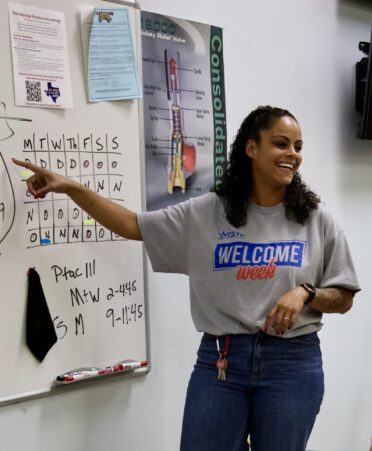(MARSHALL, Texas) – The skills that students learn at Texas State Technical College can vary depending on the programs they choose. Students often expect that the technical skills they are taught will be the only ones required to find a job, but soft skills are also important.
Soft skills are defined as personality traits that allow a person to interact positively with people they encounter, whether in the workforce or otherwise. The TSTC instructors and staff on the Marshall campus are in agreement that these skills can be just as important as technical skills.
The majority of students in the Electrical Lineworker and Management Technology program are recent high school graduates. In his classes, instructor Bryan Bass emphasizes the importance of being both good lineworkers and responsible adults. These two attributes not only will grant graduates an easier path to the best career opportunities, but also will help keep them safe in a field that has the potential to be dangerous.
“Our technology is not going to hire kids and pay them $60 an hour to act like kids,” Bass said. “They’ve got to be decent young people to get that type of money. We have to work on expanding their minds quite a bit to get them to see the bigger picture and how to concentrate and pay attention.”
The Cybersecurity program teaches TSTC students about keeping computers secure. Meanwhile, the Computer Networking and Systems Administration program teaches students how to build, manage and maintain communication systems. However, the two programs would be nothing without each other.
Computer Networking and Systems Administration instructor Andrew Christian stresses the importance of good customer service and conflict resolution skills to his students since typically the program’s graduates start off in a help desk role before moving up in their careers.
Cybersecurity instructor Amy Hertel knows that students in both programs can be on the quiet side, but the employers she keeps in contact with have told her that the candidates that stand out the most have strong emotional intelligence and leadership skills.
“Instead of following the process, they want somebody who’s going to make the process for other people to follow,” Hertel said.
However, there was one soft skill that instructors and staff agree is vital no matter where students go: communication.
“Communication is the biggest thing in the industry,” said Erica Griffin, Process Operations instructor. “I know it sounds really crazy, but you’d be surprised how many people get weeded out because they’re shy. (Employers) want to know that you will speak up when you see something that is not right because we’re not making marshmallows.”
The TSTC Career Services department regularly holds workshops for students on soft skills, resume writing, the interview process and more. The staff even holds practice interviews. Senior enrollment coach Charla Foster also encourages students to treat their time at TSTC as if it were their job.
“If you are sick and you’re not coming to class, you email your instructor and let them know,” Foster said she tells students. “If you were working and you were sick, would you just not call your boss? No. We are teaching (students) the skills that they need to perform a job, but we’re also teaching them the soft skills that they need to be effective, productive employees.”
For more information about TSTC, visit tstc.edu.
